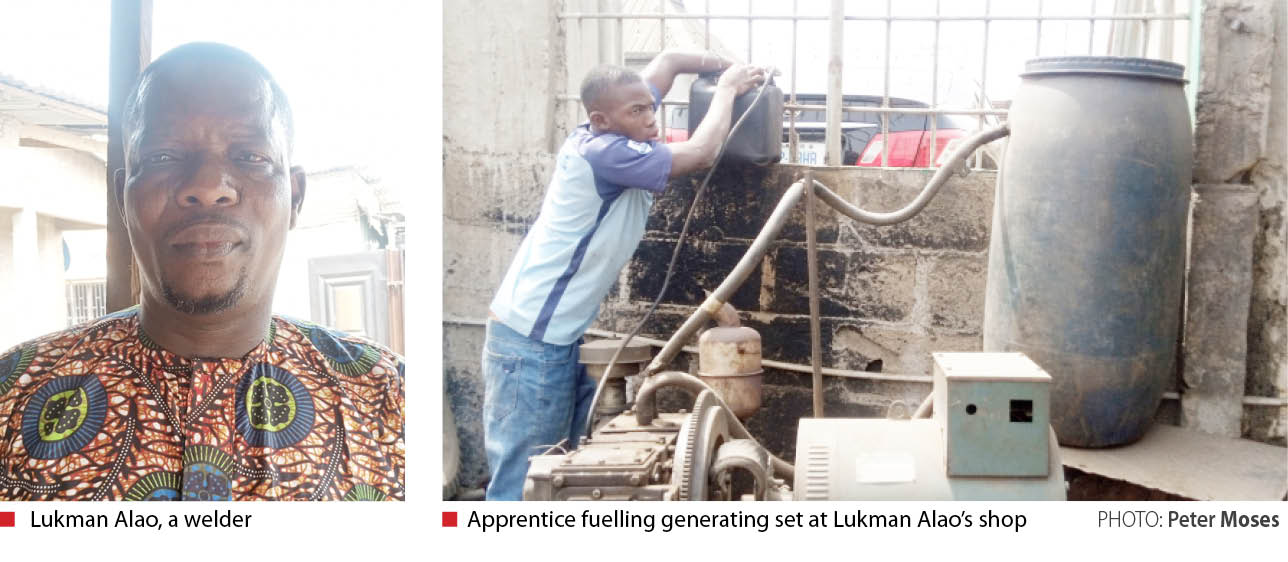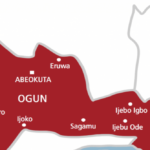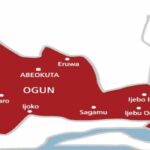Ogun: Poor electricity, bad roads driving SMEs, companies to the brink
Small and Medium-sized Enterprises and industries operating in Ota-Agbara axis in Ado Odo/Ota Local Government Area of Ogun State, one of the biggest industrial hubs in Nigeria, are battling for survival due to epileptic power supply and decaying roads infrastructure, Daily Trust Saturday reports.
- Kannywood: Six Things To Know About Veteran Actress Ladi Cima
- Lobby Presidency, Govs, For Successful Constitution Amendments, Speakers Tell N/Assembly
Lukman Alao, in his 40s, is a welder plying his trade in Ota, Ogun State. With a specialty in iron doors design and fabrication, Alao, whose workshop is located along the Ota-Idiroro Road, has been in the business for more than three decades.
Tantolohun, as fondly called by his associates, is now considering quitting his job of over 30 years, due to epileptic power which is pushing his trade to the brink.
“The only challenge I have is electricity because we are not enjoying power supply as we should.
“It has gotten so bad to the point that I’m currently considering quitting the job for another line of business because the epileptic power supply has greatly affected my business,” Alao, who has a handful of workers and trainees, told our correspondent.
Alao’s case is one of many small business owners and manufacturing industries groaning under the crushing weight of poor infrastructural amenities.
Findings by Daily Trust Saturday revealed that poor power supply and deplorable roads infrastructure have been killing small scale industries and companies in the Ota-Agbara axis.
The industrial cluster located within Ado Odo-Ota Local Government Area of the state remains the cash cow for both the federal and state governments. A large chunk of Ogun internally generated revenue comes from the axis, yet, it’s battling infrastructure challenges.

Deplorable roads
Our correspondent reports that all the major roads in the axis are in deplorable state. Their conditions are usually compounded during the wet season. The roads, especially Lagos-Ota-Abeokuta and Ota-Idiroko expressway, have become death traps to traders and road users.
Last year, there were serial protests along the routes by the leadership of the Nigerian Labour Congress.
The state chairman of NLC, Emmanuel Bankole, led members of the union and residents of Ota, under the aegis of Ota Progressive Youth Initiative, in protest against the poor state of the road.
During one of the protests, the protesters, in their hundreds, were armed with placards with various inscriptions, some of which read “Repair our road with immediate effect or face the wrath of the masses,” “400 per cent hike in transport fare due to bad road”, “Our roads are death traps,” “Fix our roads, “No good roads, No payment of tax”, “Our taxes are meant for fixing road, so what happens” and “Industries in Ota are closing down and relocating due to bad roads”, among others.
They shut down the road from Joju bus stop, leaving scores of motorists stranded for hours.
Speaking on behalf of the protesters, the state chairman of NLC lamented that despite the recent visit of Governor Dapo Abiodun and the Minister of Works and Housing, Babatunde Fashola, to assess the condition of the road, nothing had been done.
Bankole said, “Few weeks back, the governor and minister were here, telling us that they will commence the reconstruction of the road.
“We are surprised that since they came, not even a single tipper of gravel has been put on the road.
However, our correspondent observed that the Iyana Ilogbo axis to Ota under bridge, one of the most problematic portions, on the Lagos-Ota-Abeokuta has been fixed by the government.
Epileptic power supply
Findings by our correspondent revealed that due to poor power supply, some companies now use alternative power supply, thereby affecting their finances.
There are strong indications that some of the factories have relocated in recent times from the industrial hub due to the challenges.
A reliable source familiar with the operations of the industries in Ota-Agbara axis told our correspondent that a number of those factories are relocating to Kano.
“I know about three or four that have moved down to Kano,” the source said. He attributed this to high rates of taxes, bad roads and poor power supply.
Another source said out of about 250 industries located in the industrial route, only 130 are currently in operation.
Alao told Daily Trust Saturday that he pays N30,000 electricity bill monthly on his business, yet, there is little or no supply of electricity.
“I mostly depend on generators for the survival of my business. It has gotten so bad to the point that I’m currently considering quitting my job for another line of business because the epileptic power supply has greatly affected my business.
“The highest number of days we enjoy power supply in a month is 14 days and even at that, it is not stable for 24 hours.
He disclosed that he fuels his generators with at least N15,000 monthly, as an alternative power source.
“I buy a barrel of diesel which is about 30 litres for N7,500 and I will exhaust the barrel within two or three days and I will still pay N30,000 to IBEDC as my monthly bill.
“The government should please come to our rescue by ensuring stable power supply,” he said.
We’re worried, says Olota of Ota
The Olota of Ota, Professor Adeyemi Abdulkadir Obalanlege, expressed worries over relocation of industries due to infrastructural challenges.
Obalanlege said, “As the royal father, the paramount ruler within this axis, I’m more concerned because of access to job by my subjects and several times, I have spoken to the management of IBDEC but we continue to have epileptic power supply despite my intervention. This is not good for our survival. So, I’m appealing to whoever is concerned because I have tried my best to ensure that we have improvement in power supply but it seems not to be getting better.
“When you talk of citing industries, road infrastructure is elementary. Transportation is very important to the survival of any business, including manufacturing, because how do you move man, how do you move raw materials and how do you move finished products?
“So many factories are moving out of this axis. Ceeway has acquired a landed property in Sagamu which they are developing, as well as other factories.”
Olota noted that being an industrial hub, Ota “deserves a special status on infrastructure.”
It has led to retrenchment – Union leader
Speaking with newsmen, the chairman of the National Union of Food Beverages and Tobacco Employees in Ogun State, Abbey Phillip, said the development has led to the retrenchment of workforce in many organisations.
“Sincerely speaking, I might not be able to state statistically what the numbers are, but I can say that with all these challenges, it has impacted more on the informal sector than the formal sector, but we are also affected because one way or the other, there have been redundancy, retrenchment in most of these organisations based on the challenges of lack of social amenities.
“The responsibility of providing electricity solely lies on the government, so we appeal to the government to do the needful, to provide electricity and do the road network in Ota.
“Ado-Odo Ota is an industrialised local government and the government should not fold its arms and allow them take that position away from us,” Phillip, who is also the Vice Chairman of Nigeria Labour Congress (NLC) in the state, said.
We’re improving on infrastructure – Ogun govt
Speaking on the development, the Special Adviser to the Governor (Public Communications), Remmy Hazzan, admitted that there are challenges in the industrial hub, but was quick to add that the government has been improving on the infrastructures than the way the previous government left the region.
According to him, the ongoing Atan-Lusada-Agbara road construction remains one of the projects that would address concerns of the manufacturers in the area.
“So, we reckon that there have been quite a lot of concerns for most of the industries there. Some of those concerns are beyond us as a state because if for example, an industry has reasons to believe that the economic environment is not as friendly as they would have wanted, that is beyond us as a state, but the one that concerns us which is within our grasp, we are striving to ensure that we encourage these industries to stay and that much we are doing.
“We will do interface that will help to address the concerns of these stakeholders, however, those ones that are within our purview, for example, this issue of power, thank God for the liberalisation that is going on now, states are beginning to partner with power agencies, both private and public to localise distribution in such a way that the needs of specific areas will be met and Agbara, for us, is a cash cow and whatever needs to be done to ensure that we localise and make adequate the energy needs of that locality we’ll do,” Hazzan said.

 Join Daily Trust WhatsApp Community For Quick Access To News and Happenings Around You.
Join Daily Trust WhatsApp Community For Quick Access To News and Happenings Around You.


